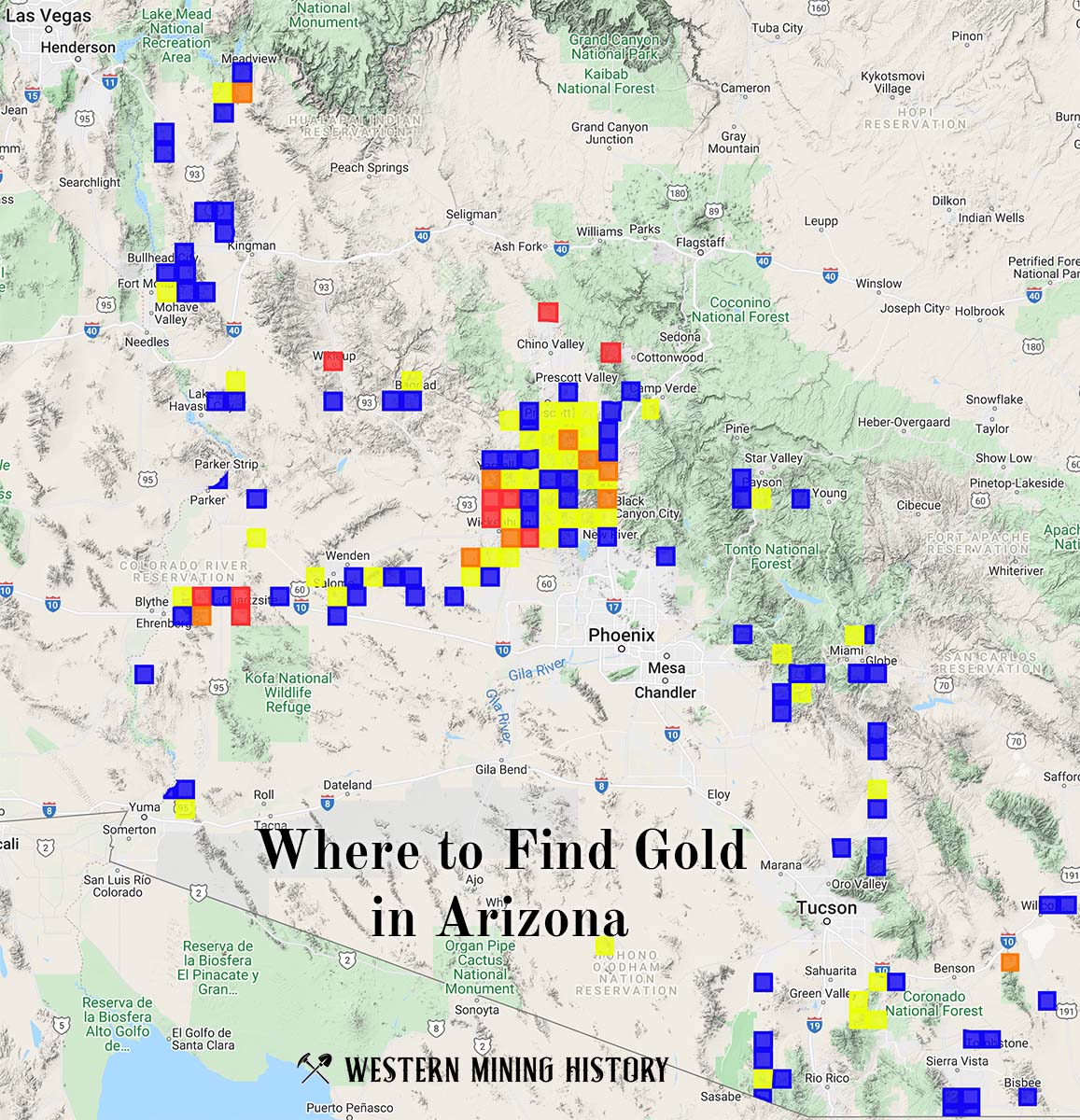The Henrietta Mine is a gold mine located in Yavapai county, Arizona at an elevation of 5,200 feet.
About the MRDS Data:
All mine locations were obtained from the USGS Mineral Resources Data System. The locations and other information in this database have not been verified for accuracy. It should be assumed that all mines are on private property.
Mine Info
Elevation: 5,200 Feet (1,585 Meters)
Commodity: Gold
Lat, Long: 34.46111, -112.29056
Map: View on Google Maps
Mine Description
The Henrietta mine which, in the early days, was known as the Big Bug, is about one-half mile north of Bigbug Creek and one mile west of Poland siding.
Browne's report for 1868 states that, in 1866, the Big Bug mine was some 50 feet deep and was producing ore from near the surface. In 1871, according to Raymond, the Big Bug vein was not being worked, but the Big Bug 10-stamp mill was treating gold ores from the vicinity (37) At that time, the combined costs of mining and milling amounted to about $9 per ton.
The following data are largely abstracted from Lindgren's report: In 1883 and 1884, the Big Bug property was the most prominent one in the district. During this early period, the mine made a large production mainly from the oxidized gold ores from the upper levels. From 1915 to 1919, the mine was operated by the Big Ledge Copper Company which did considerable development below the old workings and produced gold-bearing copper ore. The property was equipped with a 100-ton flotation mill. In 1923, this company was reorganized as the Huron Copper Mining Company. Some shipments of copper ore containing gold were made in 1926 and 1930.
A longitudinal section of the workings is shown in U. S. Geol. Survey Bulletin 782. The old developments, which extended to the sulphide zone, include a 500-foot shaft, on the ridge, with a 1,500-foot tunnel through the ridge, 220 feet below the collar, and considerable stoping. Farther north, on the Gopher claim, the vein has been opened to depths of a few hundred feet. The deeper work, which was done by the Big Ledge Copper Company, included a 2,200-foot tunnel and a 600-foot winze with levels and stopes extending a few hundred feet northward.
The vein, which occurs mainly in massive, fine-grained amphibolite or diorite, strikes north, dips about 70° W., and is from 2 to 6 feet wide. Its gangue consists of massive quartz with some calcite. About 60 per cent of the unoxidized ore consists of pyrite, chalcopyrite, sphalerite, and galena. Ore from the lower levels is reported to contain 3.2 per cent of copper and 14 per cent of iron, together with 0.2 ounces of gold and 2.7 ounces of silver per ton.
(37) Raymond, R. W., Statistics of mines and mining in the states and terri tories west of the Rocky Mountains. 1871.
Text from Arizona Lode Gold Mines and Gold Mining, Arizona Bureau of Mines. Original 1934, revised 1967
Henrietta Mine MRDS details
Site Name
Primary: Henrietta Mine
Secondary: Big Bug
Secondary: Gopher
Secondary: Henrietta-Gopher
Commodity
Primary: Gold
Secondary: Copper
Secondary: Silver
Secondary: Lead
Location
State: Arizona
County: Yavapai
District: Ticonderoga District
Land Status
Land ownership: Private
Note: the land ownership field only identifies whether the area the mine is in is generally on public lands like Forest Service or BLM land, or if it is in an area that is generally private property. It does not definitively identify property status, nor does it indicate claim status or whether an area is open to prospecting. Always respect private property.
Holdings
Not available
Workings
Type: Underground
Ownership
Owner Name: Pland Junction Mining Corp.
Home Office: Mayer, Az.
Years: 1986 -
Production
Not available
Deposit
Record Type: Site
Operation Category: Producer
Deposit Type: Vein
Operation Type: Unknown
Years of Production:
Organization:
Significant: N
Deposit Size: S
Physiography
General Physiographic Area: Intermontane Plateaus
Physiographic Province: Basin And Range Province
Physiographic Section: Mexican Highland
Mineral Deposit Model
Not available
Orebody
Form: TABULAR
Structure
Type: L
Description: Veins Parallel Foliation For Most Part
Alterations
Alteration Type: L
Alteration Text: None
Rocks
Name: Andesite
Role: Associated
Age Type: Host Rock Unit
Age in Years: 1720.000000+-
Dating Method: U-Pb (zircon)
Material Analyzed: Zircon
Age Young: Proterozoic
Name: Tuff
Role: Associated
Age Type: Host Rock Unit
Age in Years: 1720.000000+-
Dating Method: U-Pb (zircon)
Material Analyzed: Zircon
Age Young: Proterozoic
Name: Andesite
Role: Host
Age Type: Host Rock Unit
Age in Years: 1720.000000+-
Dating Method: U-Pb (zircon)
Material Analyzed: Zircon
Age Young: Proterozoic
Name: Diorite
Role: Associated
Age Type: Associated Rock
Age Young: Late Cretaceous
Name: Diorite
Role: Associated
Age Type: Host Rock Unit
Age Young: Neoproterozoic
Analytical Data
Analytical Data: LOWER LEVEL ASSAY: 3.2 % CU, 14 % FE, 0.2 OZ. AU/TON, 2.7 OZ. AG/TON
Materials
Ore: Pyrite
Ore: Chalcopyrite
Ore: Galena
Ore: Sphalerite
Comments
Comment (Deposit): DEPOSIT IS VEIN WHICH CUTS PRECAMBRIAN METAVOLCANIC ROCKS AND IS LOCALIZED NEAR RHYOLITE DIKES.
Comment (Production): ITEM (1) IS $1,200,000 OF GOLD PRODUCTION AT $20.67 PER OUNCE. DURING 1984-1986, INTERMITTANT PRODUCTION OF PYRITIC CONCENTRATE.
Comment (Development): DURING 1984-1986, CONSTRUCTION OF GRAVITY MILL AND INTERMITTANT PRODUCTION OF PYRITIC CONCENTRATE.
References
Reference (Deposit): USGS BULL 782, P. 137.
Reference (Deposit): ELSING, M.J. AND HEINEMAN, R.E., 1936, ARIZONA METAL PRODUCTION: ARIZONA BUREAU OF MINES BULLETIN 140, P. 101.
Reference (Deposit): NIEMUTH, N.J., 1987, ARIZONA MINERAL DEVELOPMENT 1984-1986: ARIZONA DEPARTMENT OF MINES AND MINERAL RESOURCES DIRECTORY 29, 46 P.
Reference (Other Database): CIMRI
Reference (Production): A.S.B.M. BULL. 140 , P. 101
Arizona Gold

"Where to Find Gold in Arizona" looks at the density of modern placer mining claims along with historical gold mining locations and mining district descriptions to determine areas of high gold discovery potential in Arizona. Read more: Where to Find Gold in Arizona.